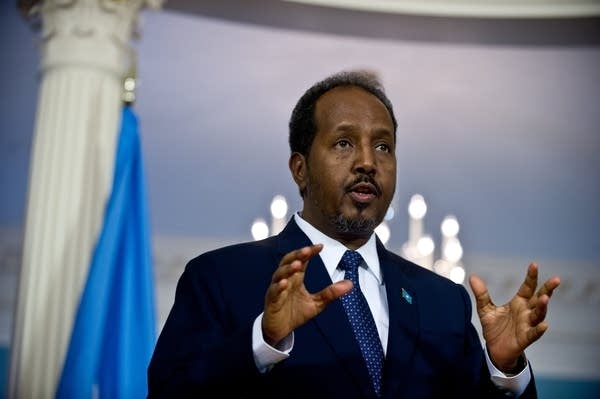Why Somali presidents come to Minnesota and what it means

Go Deeper.
Create an account or log in to save stories.
Like this?
Thanks for liking this story! We have added it to a list of your favorite stories.
Somalia boasted a stable government, new prime minister and functioning parliament the last time President Hassan Sheikh Mohamud came to the Twin Cities.
The country's circumstances are very different now as Mohamud returns to speak tonight to thousands of Somalis at the University of Minnesota. The jubilant mood that marked his 2013 visit is gone. Many Somalis now question Mohamud's ability to bring much-needed stability to the country bogged down by cycles of insecurity, poverty and underdevelopment.
Mohamud's visit is more than a Minnesota courtesy call. The state is home to the nation's largest Somali-American population, an influential group that helps sustain Somalia's economy through investment and money transfers. The community is gaining political clout here and Mohamud will need its help to get Somalia on track. But people here are divided on whether Mohamud can lead the country from its current problems.
Related coverage:
• May 2014: House bill may ease Somali remittance program worries
• Aug. 2014: New law will restore a financial lifeline to Somalia
Turn Up Your Support
MPR News helps you turn down the noise and build shared understanding. Turn up your support for this public resource and keep trusted journalism accessible to all.
"We do not deny that there are challenges in Somalia," Mohamud told CNN on Wednesday. "We are not anymore the Somalia of the piracy, the Somalia of terrorists, the Somalia of famine. Somalia has a great future."
The future seemed bright when Mohamud arrived in Minneapolis in January 2013, four months after he became president and a day after the United States formally recognized the Somali government for the first time in more than two decades. Dozens of Somalis had returned to their country to start businesses and visit relatives.
Many counted on Mohamud to make Somalia stand on its feet by defeating al-Shabaab, the militant group that's fighting to topple his government.
It didn't happen. Instead, al-Shabaab, a militant group linked to al-Qaeda, is stepping up its campaign of violence and destruction in Somalia's capital, Mogadishu. The recent end of the Islamic holy month of Ramadan ushered in a wave of assassinations and explosions. On July 8, the group stormed the presidential palace for the second time this year.
Al-Shabaab has also taken responsibility for the killing of five members of parliament since the beginning of the year, including a former Minnesota resident, Saado Ali Warsame, a popular Somali singer and lawmaker. The United Nations recently warned that over 350,000 displaced people in the Somali capital were facing acute hunger crisis.
Somali leaders understand Somalis in Minnesota are key to rebuilding peace in the African country, said Abdirashid Ahmed, East African community specialist for the city of Minneapolis.
The minister for public works and reconstruction, a number of lawmakers in the Somali parliament and at least one Somali cabinet member, Nadifo Mohamed Osman, hail from Minnesota.
"There are some people who strongly support the president's policies, the are some who oppose the president's policies, but, individually, I believe that overwhelming majority of the Somali community in Minnesota will welcome the president even though there will be some who will protest," Ahmed said.
Protests are expected to take place outside Northrop Auditorium on the university campus, where Mohamud will deliver his speech.
The community wants to send a "strong message" to the president about his failures in his office, and for not leading the country on the path to progress and stability, said Ali Warsame, one of the protest organizers. Warsame said they expect at least 500 people to attend the protest.
"Now that he's been governing past two years, Somalia is actually going back to, is heading very wrong direction," Warsame said. "The community is very energized and very much determined to send a strong message to the president, so that he does not come back here anymore."
The political landscape for Somali-Americans in Minnesota has also changed dramatically since Mohamud's last visit.
In November, Minneapolis Somalis for the first time managed to send one of their own to city council. On Tuesday, Minneapolis legislative candidate Mohamud Noor will face off against longtime state Rep. Phyllis Kahn in a primary that could make Noor the first Somali-American in the state Legislature.
Some here, though, say visits from Somalia leaders don't help the efforts of Somali-Americans in Minnesota, that they simply open old wounds from across the globe.
"Somali politicians coming through Minnesota are having a negative impact in the community by bringing the kind of violent politics in Somalia to Minnesota," said Jamal Abdulahi, a candidate for Rosemount City Council.
Somali-Americans have made significant investments and contributions to Somalia, Abdulahi said, but community members organize themselves along clan lines when high-profile politicians come to Minnesota, with conflict arising from who should welcome the leaders.
"Somali politicians always preach the same message of 'Come back to Somalia and help build the country,'" he said, "when in reality rarely anyone goes back permanently."




